Category: Music
Earworms
You know those snatches of songs that get stuck in your brain and you can’t stop singing them under your breath, or hearing them for hours on end? That’s what they’re called, and needless to say, some killjoy doctor has a remedy for them.
I actually enjoy mine, because the ones that could irritate me (e.g. anything by Lady Gaga or Taylor Swift) won’t be recalled for the simple reason that I haven’t heard them — I don’t listen to any modern music.
This morning’s earworm, for instance, was Burning Rope by Genesis — specifically, the lead solo just after the 4-minute mark.
I’ll post more of them — mostly, they put in an appearance in the mornings during my wake-up time — and while a lot of them will be quality, there will be times when it’s all Yes We Have No Bananas.
You have been warned.
Disturbing Juxtapositions
Sometimes I wonder if I’m going crazy or if I just see things that aren’t there.
Here’s one example. I woke up the other day with a song glued into my brain — you know what I mean, right? Anyway, the song was Pink Floyd at their most wonderfully obscure, i.e. See Emily Play.
So of course I went onto Ewwwtchoob and watched the thing. All the way through, though, I couldn’t shake the nagging feeling that the video was reminiscent of another piece of surreal moviemaking — and then I remembered the final scene from Antonioni’s Blow Up.
The two scenes are in no way alike, cinematically speaking — one is in black & white and is essentially a music video, while the other is deathly silence played in color. But both are mimes, and wonderfully executed. Was it the mimes, or the similar locations in a park which triggered the association?
Or maybe it was just Syd Barrett and Michelangelo Antonionini who were crazy.
Afterthought: I think Blow-Up was created (1965-66) before See Emily Play was filmed (1967).
And just to drive everybody else crazy (why should I be the only one), Blow Up featured the Yardbirds in the famous (and disturbing) night club scene. Which is why I sometimes associate Jimmy Page with Antonionini.
Test Beds Part IV
Finally, the acoustic guitars.
I’m going to exclude the “classical” / nylon-stringed types, because quite frankly I know nothing about the type, never having played classical guitar nor even been a fan of the genre. (Yeah, John Williams, Andres Segovia, Julian Bream… I have a few of their albums but mostly for background listening.)
Let’s talk about the others.
I’ve always been a fan of “big box” a.k.a. “dreadnought”-style guitars such as the Martin D45 (D for dreadnought):
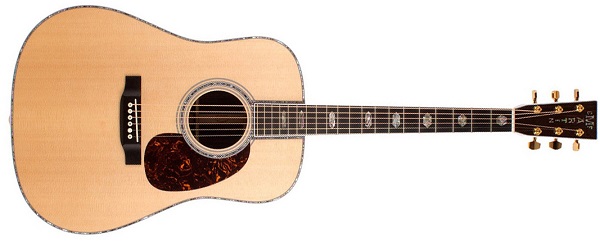
…which are the Rolls-Royce, if you will, of box guitars. The Gibson J200 (J for jumbo, geddit?) is the Bentley of the same:
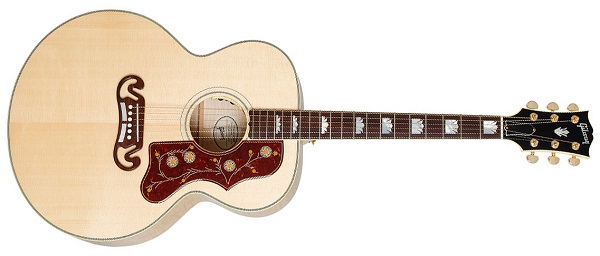
Myself, I prefer the Gibson Jumbo shape (those curves remind me of a recumbent Sophia Loren hubba hubba). For those who care not for the shape, Gibson’s squared-off dreadnought style should do, e.g. the Hummingbird:
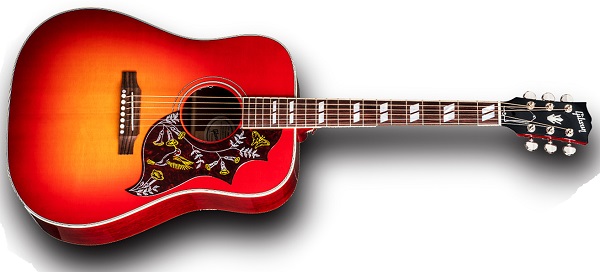
I should point out that Gibson acoustic guitars are not made in the “regular” Gibson plants in Tennessee etc., but at their custom shop in Wyoming. As far as price goes, they are only marginally less expensive than Martin.
Changing gears a bit, I have to confess that while the booming sound of the dreadnoughts and jumbos are a personal liking, I also enjoy the compact, compressed sound of the Ovation round-backed acoustics:
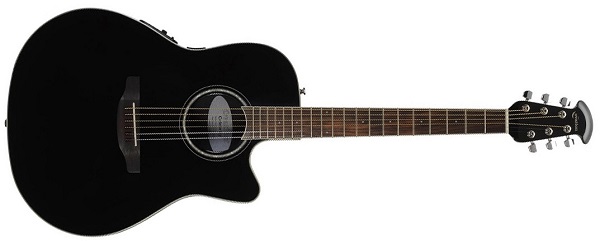
As a rule, they’re also a little less fragile than your regular-built acoustics because their back shell is shaped plastic and not flat wood. Also, they’re a generally lot cheaper than the Gibsons and Martins.
.I’ve never been able to play 12-stringed guitars. Even when my left-hand fingertips were calloused from 6-night-per-week professional bassplaying, 12-string guitars always beat up my fingers. I like the sound of a 12-string, though; and I have to admit, if I played acoustic guitars more often, I could be tempted into an Ovation double-neck:
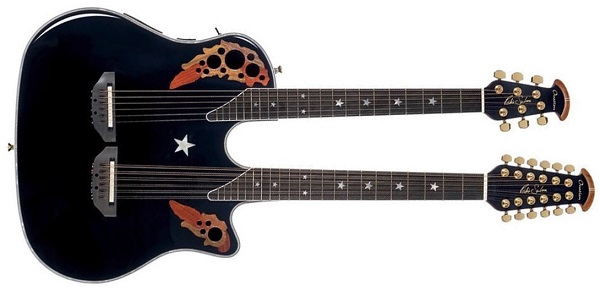
…even though this particular model is a little too Hank Williams Shirt for my liking.
Next, we come to Taylor, but I must confess I don’t know a great deal about them other than that the ones I’ve heard have sounded wonderful. (Taylor guitars were a rarity in my South African yoof.) The ones which did catch my fancy were the Grand Auditorium line, whose sound and resonance blew me away:
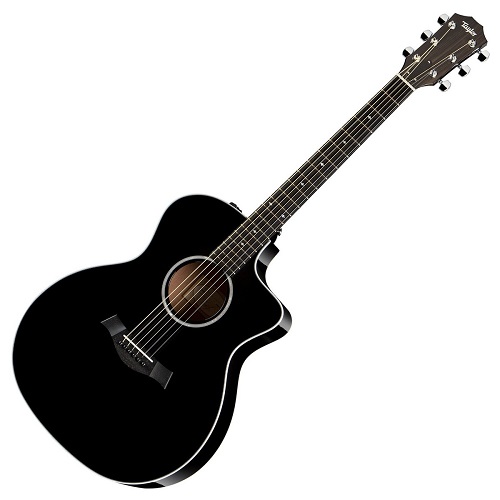
Finally, we come to Yamaha LL guitars, and I really like the sound of the 16:
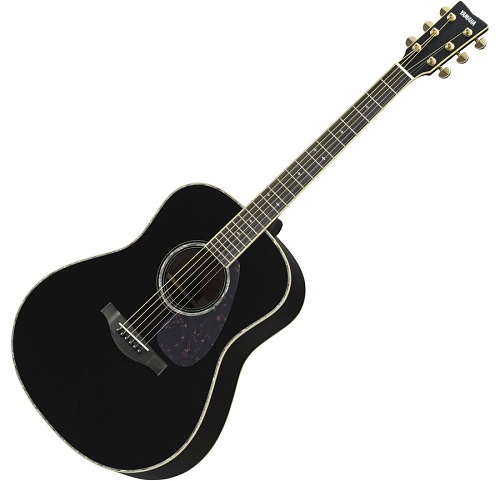
As with all guitars, once you’ve got a baseline sound — the kind of sound that appeals to you — it all comes down to feel: how the neck feels to your hand and how the box “sits” against your body.
And you don’t have to spend a ton of money on your box guitar, especially if all you’re doing is strumming away on your own, or at most playing it for a family & friends singalong. Hell, I taught myself to play on a 3/4-scale Hofner nylon-stringed guitar, and it served me well in the above functions for over a decade. And even when I “graduated” to the big time and played little solo gigs in bars and such, an Ibanez Artwood model worked just fine:

Nowadays, they run about $300, and they still sound fantastic. (The “ordinary” Ibanez acoustics are about half that price.)
One last thing: I preferred a “dark” sound on my box guitars, so I played using really heavy strings (D’Addario Medium Baritone 0.16), which also didn’t lose their tuning as quickly as the lighter ones. If you are of the same mind, make sure to get a guitar with a well-constructed neck, or else you’re just going to bow or warp the thing. Don’t ask me how I know this.
That’s the end of the Test Bed series. Sadly, I can’t do keyboards or drums, because technology has improved so much in recent years that I’m now hopelessly out of touch.
Story of my life…
Test Beds Part III
Let me kick off this piece about guitars by talking for a moment about pianos.
I know that classical concert pianists, for example, will only use certain pianos: Valentina Lisitsa her “Bosie” (Bosendorfer), Glenn Gould his ancient Steinway, Claude Debussy his Bechstein and Maurizio Pollini his Fazioli — and not more than a few hundred people in the world would be able to tell the difference in sound between any of these instruments unless they heard them side by side, being played by the same pianist playing the same piece of music. (a.k.a. “testing”). (I can tell the difference between a Fazioli and a Steinway, but only if I’m told before the music starts that the pianos are a Fazioli and a Steinway. If you were to cheat and slip in a Bechstein instead of the Steinway, I’d say it was a Steinway.)
Guitarists are far more finicky than pianists.
I have to say up front that I can’t play guitar — the six-string kind — worth a damn. However, I know quite a bit about how they function, and more importantly, how they sound. For a long time, I worked in a music store in Johannesburg which catered to the professional musician crowd, and just by listening to the guys talking, and demonstrating what they were talking about, I gradually learned all about the topic. And of course, playing in a rock band for a decade didn’t hurt, either.
Guitarists are impossibly self-critical when it comes to both their ability and the way their instruments sound, so I generally view their preference for humbucker- over single-coil pickups (pickup info here), Ernie Ball strings over D’Addario strings and ’64 Strats over ’59 Les Paul guitars, all with amused indulgence.
It’s all about personal choice and taste, in other words. And when it comes to the quality of instruments, I’m pretty sure that you could give Eric Clapton the cheapest Mexican-made Fender Stratocaster, and he’ll still make it sound better than you will your ’63 pre-CBS-sellout Precioussss. (For those non-musicians bemused by all the above terms, don’t worry: none of this means that much except to anal-retentive musicians.)
All that said, I have some very strong preferences when it comes to off-the-rack lead guitars (once the guitarists starts tinkering with the thing, swapping out pickups, changing tone controls and so on, it’s all over). Even so, I know that many Mexican-made Fender Stratocasters, for example, are not horrible, just as Squier “entry-level” Stratocaster knockoffs are not the worst way to get into music at all. I used to own one of the latter, as it happens, and once I’d put decent strings on it and acquired a couple of effects pedals, nobody could tell the sonic difference between it and a Strat. What works for you, the guitarist, is what’s most important, but I have to tell you, there are certain guitars which no guitarist is going to sneer at, or turn his nose up at when you open your case and plug it in. Here they are, in no specific order.
Fender Stratocaster. Clapton, Hendrix, Stevie Ray Vaughan, Trevor Rabin… the list goes on and on. I love Strats.
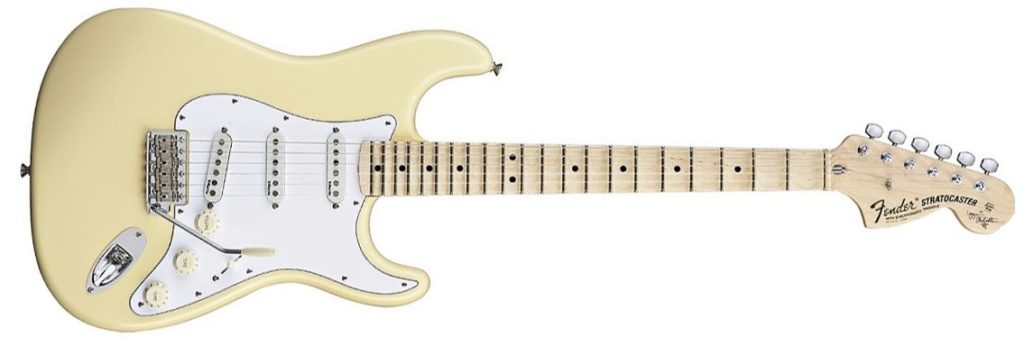
(Here’s its Squier counterpart:)

Cost of the Fender: anywhere up to $2,000 for the “Ultra” line; the Squier: $400.
Gibson Les Paul Standard. Gibson has a dizzying variety of Les Paul variants (more than I care to list or even look up), but nobody ever went wrong with a Standard, including Les Paul himself. This one is a maple-top cherry sunburst, none of which makes any difference to the sound except to people who play them:

If you want to hear how the Les Paul sounds, then listen also to Billy Gibbons and Joe Walsh. Now let Joe explain how he sets up his Les Paul, for a lesson in Extreme Guitar Dorkery.
Gibson also has a “budget” line (because Gibson-brand guitars are quite spendy) called Epiphone, and a constant buzz resonates among the YouChoob “testers” as to the difference in sound between the two, Here’s the Epi Les Paul:
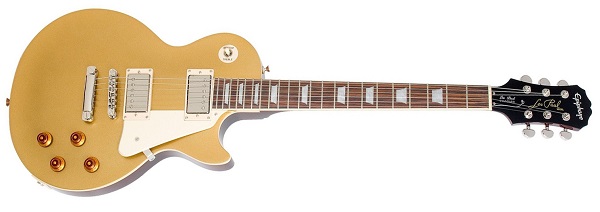
Cost of the Gibson: $2,700; the Epiphone: $450.
- Now before I go any further, allow me to state that in this matter, as in all others, such a difference in price has to be paid for by a reduction in quality — in the case of guitars, of the components. (My own Epiphone SG bass guitar is a case in point; it played perfectly well for about a month, whereupon the pickup selector switch suffered a catastrophic failure and the guitar fell silent.) The issue is not how the guitars function brand new, it’s how they’ll play in five years’ time — which is when the neck will warp because of cheap green wood used in its manufacture, the tuning heads made of tin will be rusted into immobility, etc. etc. TANSTAAFL.
All that said, I can say without fear of contradiction that if your band’s guitarist (or guitarists) can have only those two guitars (a Strat and a Les Paul), all will be well and your band will sound as good as any of the pros, subject of course to talent and decent amplification. I can say this with absolute certainty because in my old band, those are the two guitars we used for over a decade, and we sounded just fine.
Certainly, nobody is going to curl a lip when you take either of the two out of the case, and your sound will be as consistent as is possible to achieve; so when trying out a new amp, for instance, you could tell almost immediately whether your sound has improved because the if the guitar now doesn’t sound great, it’s the fault of the amp.
Now I’m going to wander off into the Guitar Dork Forest and mention a couple more of my favorites.
As far as rock music is concerned, I also like the venerable Fender Telecaster (Keith Richards, Samantha Fish, etc.) because it is a stripped-down, honest guitar that if not set on fire, will outlive Keith Richards because of its supreme simplicity:
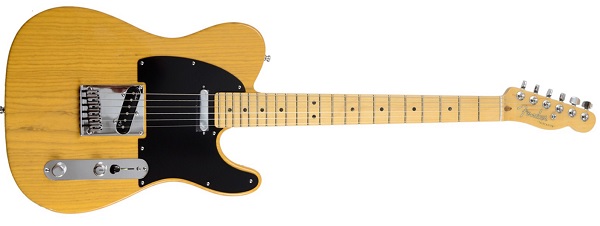
Likewise, Gibson’s SG (in this configuration, as played by AC/DC’s Angus Young, for instance):
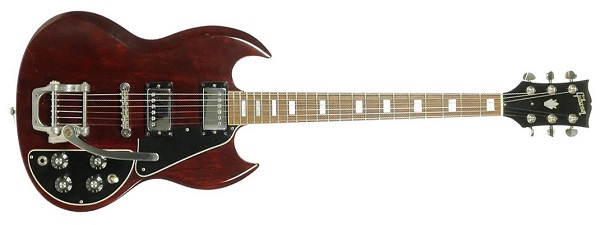
If the Les Paul and Strat are your first-choice, then the Tele and SG could be your #1a, and I will venture to suggest that your band will still sound incredible.
My choice #2 would be the Rickenbacker 300 series (305/325/360) as played by John Lennon/George Harrison, and David Crosby:
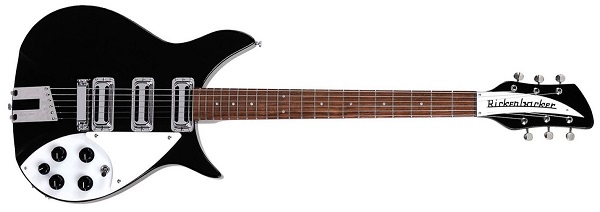
No other guitar sounds quite like the Rickenbacker, with its jangly, bright tone (the Byrds’ Mr. Tambourine Man, the Beatles’ Words Of Love), and if I were a competent guitarist with any band pretensions, I’d give the 300 series a long, hard look. As would I do for the next one, the Guild Stratford:
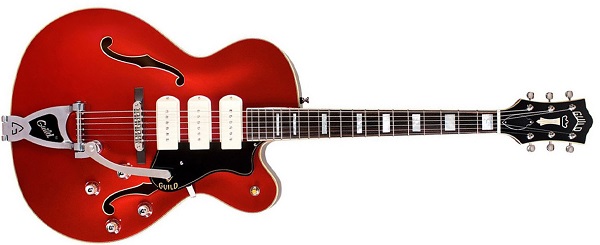
…but to be honest, this guitar (the hollow-body type, as compared to the above which all have solid bodies) is best used to play traditional jazz — and when in comes to this kind of music, nothing but nothing compares to the wonderful Gibson guitars, either the Model 175 (Steve Howe of Yes)
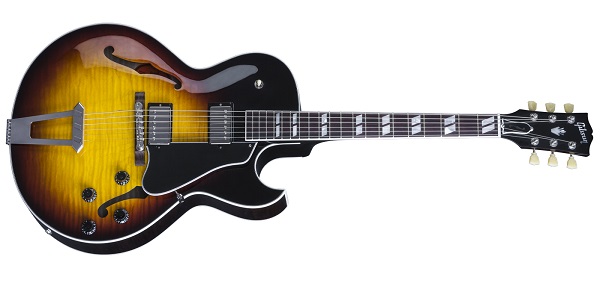
…or the Gibson (semi-hollow body) 335 (B.B. King):
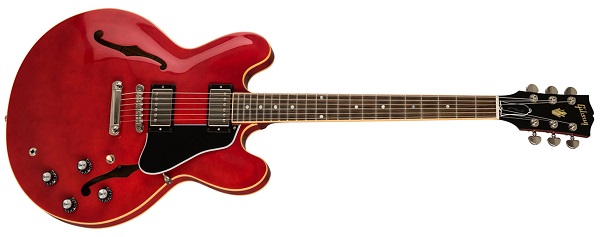
To be honest, if someone were to tell me I’d only be able to play a 335 for the rest of my life, I’d be a happy man (and Rhett Shull agrees).
As long as I could play the 335 like this guy can.
And then, of course, you get Paul Reed Smith (PRS) guitars… and Carlos Santana.

If you’ve gotta ask how much they cost… get a Les Paul.
There are literally thousands of electric guitars out there (basically proving what a fussy bunch guitarists are), and if I’ve left out your own guitar, or favorite guitar, well… sorry. But the above are my favorites, for all sorts of different reasons. And in case you’re still interested after all this, here’s Watchmojo’s top ten guitars. (Most of their lists are total shit, but this one isn’t too bad.)
All the great guitarists of modern times have played, or still play, a version of these guitars, and not one could ever argue with your choice if you stuck with only one. And all the top guitarists have played just about every guitar ever produced, because that’s what they do. Then you have guys like this one…
But you never will. And it all depends what kind of musical genre you want to play — and even then, the guitar doesn’t really matter that much, as this guy demonstrates.
Now, about acoustic guitars… till next time.
Style Points
I have written before about my old band Atlantic, and with great affection of our late lead guitarist, Kevin. While I tried to describe his guitar playing, I feel I didn’t do it justice. But now I can.
As I was stumbling and bumbling around the Internets last night, I happened upon this oldie, and if you want to see exactly how Kevin played, note the virtuosity of Focus’s Jan Akkerman — and it is absolutely no exaggeration to say that in playing this song (as Kevin used to do, just for practice), his and Akkerman’s style, down to the way they held their guitars, are identical. (Nobody in our band, and quite possibly nobody in the whole world could ever sing like Thijs van Leer.)
Kevin had better hair, though.
Enjoy.
